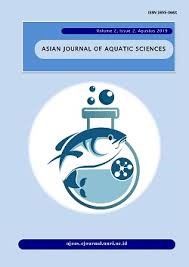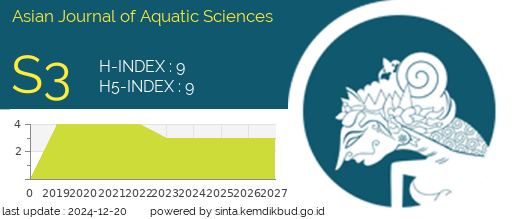IMPLEMENTATION OF CONSORTIUM BACTERIES OF Bacillus cereus ISOLATED FROM SEA AS PROTEIN SOURCE FOR PRO COFFEE BEVERAGE
DOI:
https://doi.org/10.31258/ajoas.7.3.378-385Keywords:
Protein, Bacillus cereus, Probiotics, CoffeeAbstract
Pro coffee is a fermented beverage using Bacillus cereus bacterial consortium with single-cell protein. This study aims to determine the best composition of the B. cereus consortium bacteria mixture in organoleptic aspects that panelists most prefer and the effect of adding B. cereus consortium bacteria on proximate analysis and pro coffee flavor. Organoleptic testing of probiotic coffee was conducted on 20 panelists, then continued with proximate analysis of pro coffee. The composition with the best organoleptic flavor is obtained in code D, with the treatment of adding 5% bacterial consortium B. cereus for 15 days. The analysis of taste obtained has a value of 0.000 <0.05, and the study results show that the significance value is smaller than the significance level. Hence, the treatment results give the effect of adding bacterial consortium to pro-coffee. The addition of bacterial consortium B. cereus to probiotic coffee, in the form of moisture, ash, protein, fat, and carbohydrate content, is 0.000 <0.05. The analysis results show that the significance value is greater than the significance level, so the treatment results do not give the effect of adding bacterial consortium to pro coffee
Downloads
References
1. Kerry, R.G., Patra, J.K., Gouda, S., Park, Y., Shin, H.S., & Das, G. Benefaction of Probiotics for Human Health: A Review. Journal of Food and Drug Analysis, 2018; 26 (3): 927-939.
2. Feliatra, F., Nursyirwani, N., Tanjung, A., Adithiya, D.S., Susanna, M., & Lukistyowati, I. The Effectiveness of Heterotrophic Bacteria Isolated from Dumai Marine Water of Riau, used as Antibacterial against Pathogens in Fish Culture. IOP Conference Series: Earth and Environmental Science, 2018; 116 (1).
3. Feliatra, F., Batubara, U.M., Effendi, I., & Adelina, A. Optimization of an Effective Growth Medium for Biomass Production of Bacillus cereus. The Electrochemical Society, 2021: 1-5.
4. Purwaningtyas, Y.R. Produksi Protein Sel Tunggal Gluconacetobacter xylinus dengan Medium Limbah Cair Tempe menggunakan Metode Air - Lift Bioreactor. Universitas Sanata Dharma. Yogyakarta, 2019.
5. Sridevi, G.B., Devendra, H., Basavaraj, K., & Pushpa, S. Coffee Starter Microbiome and in Silico Approach to Improve Arabica Coffee. Journal Food and Technology, 2019: 1-20.
6. Azimah, F.N., & Qomariah, U.K.N. Uji Organoleptik dan uji Hedonik Bubur Bola Ubi Ungu (Ipomoea batatas L). Exact Papers in Compilation (EPiC), 2024; 6(1): 15-19.
7. Tyas, D.E., Widyorini, N., & Solichin, A. Perbedaan Jumlah Bakteri dalam Sedimen pada Kawasan Bermangrove dan Tidak Bermangrove di Perairan Desa Bedono, Demak. Management of Aquatic Resources Journal (MAQUARES), 2018; 7(2): 189-196.
8. Suzanna, A., Wijaya, M., & Fadilah, R. Analisis Kandungan Kimia Buah Terong Belanda (Cyphomandra betacea) setelah diolah menjadi Minuman Ringan. Jurnal Pendidikan Teknologi Pertanian, 2019; 5(1): 21-36.
9. Arhandhi, C.B., Aisyah, Y., & Rasdiasyah, R. Effect of Concentration of Beetroot Extracts (Beta vulgaris L.) and Gelatin on the Characteristics of Marshmallow. Jurnal Ilmiah Mahasiswa Pertanian Unsyiah, 2018; 3(4).
10. Santosa, M.P., Ismanto, I.S.D., & Nainggolan, Q.V. Nilai Tambah dan Tekno-Ekonomi Drip Coffee Honey. Uwais Inspirasi Indonesia, 2024.
11. Djoko, W., Taurhesia, S., Djamil, R., & Simanjuntak, P. Standardisasi Ekstrak Etanol Herba Pegagan (Centella asiatica). Sainstech Farma, 2020;13(2): 118–123.
12. Inuhan, B., Arreneuz, S., & Wibowo, M.A. Optimasi Produksi Protein Sel Tunggal (PST) dari Bakteri yang Terdapat pada Gastrointestinal (GI) Ikan Nila (Oreochromis niloticus) dan Ikan Kembung (Scomber canagorta). Jurnal Kajian Komunikasi, 2016; 5(1): 24 – 28.
13. Erna, E., Said, I., & Abram, P.H. Bioetanol dari Limbah Kulit Singkong (Manihot esculenta Crantz) melalui Proses Fermentasi. Jurnal Akademika Kimia, 2016; 5(3): 121-126.
14. Tambunan, A.R. Karakteristik Probiotik berbagai Jenis Bakteri Asam Laktat (BAL) pada Minuman Fermentasi Laktat Sari Buah Nanas. Universitas Lampung








